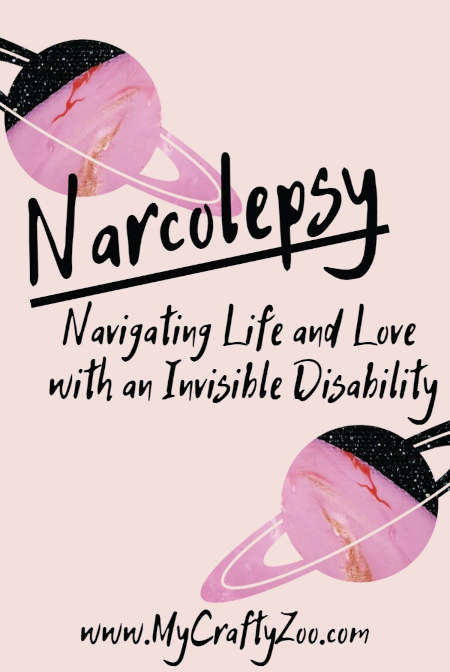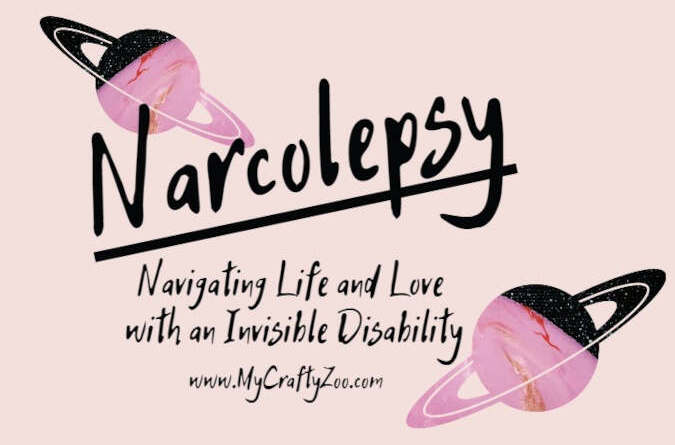Narcolepsy: How to Navigate Life and Love
Narcolepsy is a challenge, no matter how one looks at it. Awareness helps, so today we’re writing about how to navigate life, love and the daily grind.
I have written about all sorts of topics related to pretty much All Things Life, but realizing Narcolepsy and cataplexy hadn’t been discussed inspired me to share. There is way too much misunderstanding.
Two things you should know about life with narcolepsy:
- The stereotypes are wrong: we do not fall asleep everywhere, we can function, drive and so forth
- Comments about wishing you could sleep anytime, wearing helmets (stupid movies and television shows), or ‘it must be nice’ if we don’t work or whatever are never okay. It’s not nice, sleeping the way we do is terrible, we wish we could work and/or function like everyone else and I’m not gonna respond about helmets.
 A Little Back Story
A Little Back Story
For years, I couldn’t stay awake in my college classes. Professors would talk to me about not going to bars and partying so that I could focus and stay awake. No matter how much I told them that no social life was in existence for me, they didn’t believe me. Who would blame them? I would literally fall asleep while taking notes! As a humorous side note, I got so good that I would continue holding my pen as if I were writing while I was asleep! Needless to say, it took me quite a while to graduate, not because I was failing but because I was convinced I was just too tired.
Eventually, I married my husband and falling asleep was just something I did. We didn’t know why, it just happened. We could be talking or doing anything and I’d just drift off for a bit. He was super understanding and for that I am thankful! One day, as I was walking into the living room I randomly collapsed. I wasn’t having a seizure, I didn’t pass out, just sort of crumbled toward the floor. My husband jumped over the couch and caught me. It was an awesome save, but a terrifying experience.
We began going to doctors, who thought I had Multiple Sclerosis. Also a terrifying aspect. Eventually, as I was sitting in my Neurological Psychology class, they played a video with a goat that had Narcolepsy with Cataplexy and there is was! That’s exactly what happened to me! So off to the doctor I went, armed with new knowledge and research. The testing and referrals began.
I was diagnosed with Narcolepsy a month after I graduated from college.
Accepting Narcolepsy
Narcolepsy is an invisible disability. Nobody can tell I have it until the symptoms occur, and even then they are generally mistaken as to what is going on with me. I had a very hard time with accepting my issue. Partially because I have control issues but mostly because I thought my life was over. My dreams were through. So I sank into an ugly depression for years. I hid from social situations with new people, I was and still kind of am terrified to step out of my shell.
I don’t like needing help, not for regular day to day things.
Eventually, I got to a point where I could accept it. It’s just part of who I am. Often I refer to my Narcolepsy and cataplexy as if they are an entity within me. It helped me to redirect the anger and hurt I had directed at myself to the issue itself. This has greatly helped my self esteem. Now, when I have to nap or when I collapse, I point the frustration at narcolepsy and cataplexy instead of feeling bad about myself. Counseling helped with that as well.
If you suffer from live with a disability, accepting it is the most important step to learning to love life again.
Dating and Socializing with Disabilities
One thing that is great these days is that there is information everywhere about disabilities. They aren’t life ending and it doesn’t mean someone is ‘less than,’ and while it never has, I love that the stigma is being lessened somewhat. There are an entire sites dedicated to deaf dating, disability dating, and even a youtube channel dedicated to the topic! I love that the stigmas are being broken!
Unfortunately, they have yet to be completely shattered so here’s the important stuff to know, whether you have narcolepsy, another disability or just know someone who does. This is for you.
- We don’t have to announce our issues, nor do we necessarily want to go in depth about it. I get that others are curious, but if you aren’t comfortable or just don’t want to talk about it, I recommend going with a brush off of the topic such as ‘ya know, it’s just my life.’
- If your disability is triggered by things (like my cataplexy), choose environments that won’t cause stimulation
- Nothing says you have to stay in relationships where you and your challenges are not accepted. Jokes going to far even after you’ve expressed your discomfort? Walk away and move on. You are worth it.
- Establish and stick to your schedule. In example, my friends know that there are times when we are hanging out that I have to go nap. They aren’t negative, they just find something to keep themselves busy while I take a 15 minute nap.
- Don’t be afraid to step out of your comfort zone. If it isn’t working out in the new place, when you are with understanding people, you can let them know you need to leave, that is absolutely okay!
I’d love to hear your thoughts!
If you’d like to hear more about this topic, let me know in the comments!




Oh my gosh first of all ((((hugs) your story sounded like me but not quite the same. I am ALWAYS exhausted not fatigued but my soul is just done. I have been complaining to doctors for years and they have tried me in different meds including Ambien (because I sleep for crap at night). Finally a dr sent me for a sleep study (an in home one) and it was discovered I have Obstructive Sleep Apnea. Side note people with sleep apnea should never take sleep medicine. So I happily started using a CPAP thinking I would be cured. Well I am still exhausted during the day and now using the CPAP has caused other issues. My psychiatrist started me on Provigil to help with my depression medication and suddenly I was awake during the day. I wasn’t wanting to nap (which I don’t do on purpose or for pleasure). I was actually able to stay awake for the whole day. I had to stop that medication because my insurance didn’t cover it. I have also been seen by a neurologist because they thought I might have MS. I don’t have enough of the symptoms to qualify for an MS diagnosis. So for now I use my CPAP at night and struggle to stay awake during the day.
Oh, Heather! I totally relate! I definitely recommend finding someone who specializes in sleep medicine. The narcolepsy diagnosis depends (I guess) on how you go through the sleep cycles and how long it takes. I get to the third stage of R.E.M. in less than 45 seconds which is supposed to take 45 minutes to an hour and a half. Be careful with provigil though, it cause heart palpitations for me and they’ve never went away. I was later diagnosed with sleep apnea as well and have a CPAP. At this point, my neurologist has me on a very strong sleep medicine that forces my brain to go through the cycles properly, in turn going through the sleep cycles helps with the cataplexy. It’s not perfect and I’m still fatigued constantly, but it’s definitely an improvement. I hope you’ll come back and keep in touch!